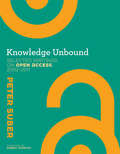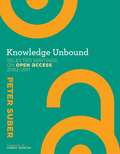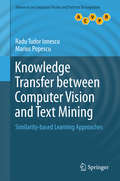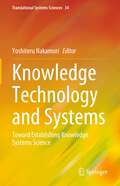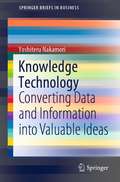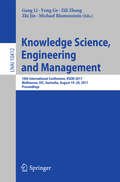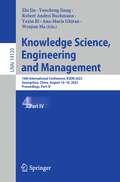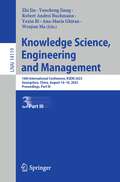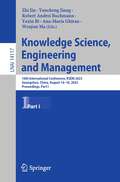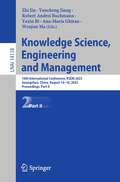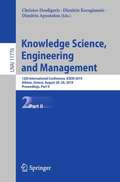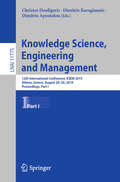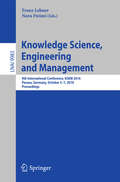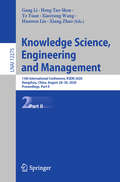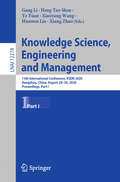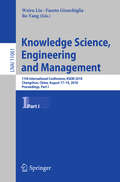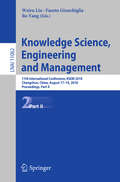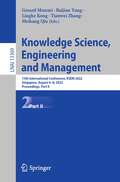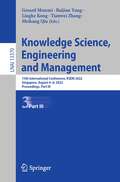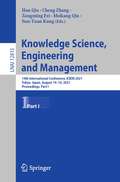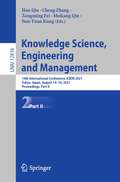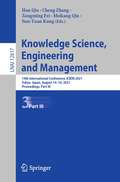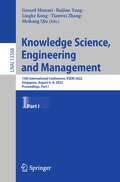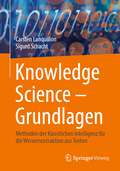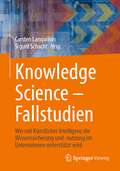- Table View
- List View
Knowledge Unbound: Selected Writings on Open Access, 2002-2011 (The\mit Press Ser.)
by Peter SuberInfluential writings make the case for open access to research, explore its implications, and document the early struggles and successes of the open access movement. Peter Suber has been a leading advocate for open access since 2001 and has worked full time on issues of open access since 2003. As a professor of philosophy during the early days of the internet, he realized its power and potential as a medium for scholarship. As he writes now, “it was like an asteroid crash, fundamentally changing the environment, challenging dinosaurs to adapt, and challenging all of us to figure out whether we were dinosaurs.” When Suber began putting his writings and course materials online for anyone to use for any purpose, he soon experienced the benefits of that wider exposure. In 2001, he started a newsletter—the Free Online Scholarship Newsletter, which later became the SPARC Open Access Newsletter—in which he explored the implications of open access for research and scholarship. This book offers a selection of some of Suber's most significant and influential writings on open access from 2002 to 2010. In these texts, Suber makes the case for open access to research; answers common questions, objections, and misunderstandings; analyzes policy issues; and documents the growth and evolution of open access during its most critical early decade.
Knowledge Unbound: Selected Writings on Open Access, 2002--2011
by Peter Suber Robert DarntonPeter Suber has been a leading advocate for open access since 2001 and has worked full time on issues of open access since 2003. As a professor of philosophy during the early days of the internet, he realized its power and potential as a medium for scholarship. As he writes now, "it was like an asteroid crash, fundamentally changing the environment, challenging dinosaurs to adapt, and challenging all of us to figure out whether we were dinosaurs." When Suber began putting his writings and course materials online for anyone to use for any purpose, he soon experienced the benefits of that wider exposure. In 2001, he started a newsletter -- the Free Online Scholarship Newsletter, which later became the SPARC Open Access Newsletter -- in which he explored the implications of open access for research and scholarship. This book offers a selection of some of Suber's most significant and influential writings on open access from 2002 to 2010. In these texts, Suber makes the case for open access to research; answers common questions, objections, and misunderstandings; analyzes policy issues; and documents the growth and evolution of open access during its most critical early decade.
Knowledge Transfer between Computer Vision and Text Mining
by Radu Tudor Ionescu Marius PopescuThis ground-breaking text/reference divergesfrom the traditional view that computer vision (for image analysis) and stringprocessing (for text mining) are separate and unrelated fields of study,propounding that images and text can be treated in a similar manner for thepurposes of information retrieval, extraction and classification. Highlightingthe benefits of knowledge transfer between the two disciplines, the textpresents a range of novel similarity-based learning (SBL) techniques founded onthis approach. Topics and features: describes a variety of SBL approaches,including nearest neighbor models, local learning, kernel methods, andclustering algorithms; presents a nearest neighbor model based on a noveldissimilarity for images; discusses a novel kernel for (visual) wordhistograms, as well as several kernels based on a pyramid representation; introducesan approach based on string kernels for native language identification; containslinks for downloading relevant open source code.
Knowledge Technology and Systems: Toward Establishing Knowledge Systems Science (Translational Systems Sciences #34)
by Yoshiteru NakamoriThis book discusses technology and systems to create valuable ideas from data through the construction of knowledge. The primary concern is to make better decisions about economic and management issues in today’s information-flooded society. Human creative activity is in the realm of soft technology, with no physical entity to operate. Focusing on the ability of knowledge as judgment power, this definition results: “Knowledge technology is soft technology that underpins the human creative activities of converting data and information into knowledge, creating new ideas based on that knowledge and validating those ideas.” That definition includes a wide range of soft technologies developed in informatics, management studies, and systems science. The knowledge system creates ideas from data and knowledge through knowledge technologies. Based on the proposition that knowledge emerges by the interaction between explicit and tacit knowledge, another definition is possible: “The knowledge system is a system that promotes interaction between codified and personalized knowledge and creates ideas for solving a specific problem.” Codified knowledge includes data and information, while personalized knowledge is empirical knowledge or wisdom that is difficult to put into words. Building a knowledge system requires mathematical or intelligent knowledge technology and participatory knowledge technology to create or manage codified knowledge and personalized knowledge. For example, a company builds cross-sectional knowledge systems by gathering human resources from various departments, according to the purpose, as in new product development or sales promotion. Chapter 1 defines knowledge technology and the knowledge system and organizes the challenges in their development, while Chapters 2 through 9 introduce mathematical or intelligent knowledge technologies by researchers at the forefront of knowledge technology development.
Knowledge Technology: Converting Data and Information into Valuable Ideas (SpringerBriefs in Business)
by Yoshiteru NakamoriThis book reviews creative technologies that underpin the human activities of converting data and information into knowledge, creating new ideas based on that knowledge, and validating those ideas. The book calls such creative technology “knowledge technology” and explores its challenges in the age of big data. Today, artificial intelligence and big data are successfully performing pattern recognition and decision making on behalf of humans, who are incapable of processing large amounts of information instantly and accurately. In using only past data, however, there are limits to future predictions with artificial intelligence and big data. Humans need to take the lead in predicting or creating the future by trying to understand why data emerged. Knowledge technology contributes to that understanding, regardless of the field of origin. As a matter of fact, knowledge technology includes many technologies developed in informatics, management study, and systems science. The desirable features of knowledge technology are the complementary use of rational and intuitive approaches, the integration of results from quantitative and qualitative analyses, and the cooperation between artificial intelligence and humans.
Knowledge Science, Engineering and Management: 10th International Conference, KSEM 2017, Melbourne, VIC, Australia, August 19-20, 2017, Proceedings (Lecture Notes in Computer Science #10412)
by Gang Li, Yong Ge, Zili Zhang, Zhi Jin and Michael BlumensteinThis book constitutes the refereed proceedings of the 10th International Conference on Knowledge Science, Engineering and Management, KSEM 2017, held in Melbourne, Australia, in August 2017. The 35 revised full papers and 12 short papers presented were carefully reviewed and selected from 134 submissions. The papers are organized in the following topical sections: text mining and document analysis; formal semantics and fuzzy logic; knowledge management; knowledge integration; knowledge retrieval; recommendation algorithms and systems; knowledge engineering; and knowledge representation and reasoning.
Knowledge Science, Engineering and Management: 16th International Conference, KSEM 2023, Guangzhou, China, August 16–18, 2023, Proceedings, Part IV (Lecture Notes in Computer Science #14120)
by Zhi Jin Yuncheng Jiang Robert Andrei Buchmann Yaxin Bi Ana-Maria Ghiran Wenjun MaThis volume set constitutes the refereed proceedings of the 16th International Conference on Knowledge Science, Engineering and Management, KSEM 2023, which was held in Guangzhou, China, during August 16–18, 2023. The 114 full papers and 30 short papers included in this book were carefully reviewed and selected from 395 submissions. They were organized in topical sections as follows: knowledge science with learning and AI; knowledge engineering research and applications; knowledge management systems; and emerging technologies for knowledge science, engineering and management.
Knowledge Science, Engineering and Management: 16th International Conference, KSEM 2023, Guangzhou, China, August 16–18, 2023, Proceedings, Part III (Lecture Notes in Computer Science #14119)
by Zhi Jin Yuncheng Jiang Robert Andrei Buchmann Yaxin Bi Ana-Maria Ghiran Wenjun MaThis volume set constitutes the refereed proceedings of the 16th International Conference on Knowledge Science, Engineering and Management, KSEM 2023, which was held in Guangzhou, China, during August 16–18, 2023. The 114 full papers and 30 short papers included in this book were carefully reviewed and selected from 395 submissions. They were organized in topical sections as follows: knowledge science with learning and AI; knowledge engineering research and applications; knowledge management systems; and emerging technologies for knowledge science, engineering and management.
Knowledge Science, Engineering and Management: 16th International Conference, KSEM 2023, Guangzhou, China, August 16–18, 2023, Proceedings, Part I (Lecture Notes in Computer Science #14117)
by Zhi Jin Yuncheng Jiang Robert Andrei Buchmann Yaxin Bi Ana-Maria Ghiran Wenjun MaThis volume set constitutes the refereed proceedings of the 16th International Conference on Knowledge Science, Engineering and Management, KSEM 2023, which was held in Guangzhou, China, during August 16–18, 2023. The 114 full papers and 30 short papers included in this book were carefully reviewed and selected from 395 submissions. They were organized in topical sections as follows: knowledge science with learning and AI; knowledge engineering research and applications; knowledge management systems; and emerging technologies for knowledge science, engineering and management.
Knowledge Science, Engineering and Management: 16th International Conference, KSEM 2023, Guangzhou, China, August 16–18, 2023, Proceedings, Part II (Lecture Notes in Computer Science #14118)
by Zhi Jin Yuncheng Jiang Robert Andrei Buchmann Yaxin Bi Ana-Maria Ghiran Wenjun MaThis volume set constitutes the refereed proceedings of the 16th International Conference on Knowledge Science, Engineering and Management, KSEM 2023, which was held in Guangzhou, China, during August 16–18, 2023. The 114 full papers and 30 short papers included in this book were carefully reviewed and selected from 395 submissions. They were organized in topical sections as follows: knowledge science with learning and AI; knowledge engineering research and applications; knowledge management systems; and emerging technologies for knowledge science, engineering and management.
Knowledge Science, Engineering and Management: 12th International Conference, KSEM 2019, Athens, Greece, August 28–30, 2019, Proceedings, Part II (Lecture Notes in Computer Science #11776)
by Dimitris Karagiannis Christos Douligeris Dimitris ApostolouThis two-volume set of LNAI 11775 and LNAI 11776 constitutes the refereed proceedings of the 12th International Conference on Knowledge Science, Engineering and Management, KSEM 2019, held in Athens, Greece, in August 2019. The 77 revised full papers and 23 short papers presented together with 10 poster papers were carefully reviewed and selected from 240 submissions. The papers of the first volume are organized in the following topical sections: Formal Reasoning and Ontologies; Recommendation Algorithms and Systems; Social Knowledge Analysis and Management ; Data Processing and Data Mining; Image and Video Data Analysis; Deep Learning; Knowledge Graph and Knowledge Management; Machine Learning; and Knowledge Engineering Applications. The papers of the second volume are organized in the following topical sections: Probabilistic Models and Applications; Text Mining and Document Analysis; Knowledge Theories and Models; and Network Knowledge Representation and Learning.
Knowledge Science, Engineering and Management: 12th International Conference, KSEM 2019, Athens, Greece, August 28–30, 2019, Proceedings, Part I (Lecture Notes in Computer Science #11775)
by Dimitris Karagiannis Christos Douligeris Dimitris ApostolouThis two-volume set of LNAI 11775 and LNAI 11776 constitutes the refereed proceedings of the 12th International Conference on Knowledge Science, Engineering and Management, KSEM 2019, held in Athens, Greece, in August 2019. The 77 revised full papers and 23 short papers presented together with 10 poster papers were carefully reviewed and selected from 240 submissions. The papers of the first volume are organized in the following topical sections: Formal Reasoning and Ontologies; Recommendation Algorithms and Systems; Social Knowledge Analysis and Management ; Data Processing and Data Mining; Image and Video Data Analysis; Deep Learning; Knowledge Graph and Knowledge Management; Machine Learning; and Knowledge Engineering Applications.The papers of the second volume are organized in the following topical sections: Probabilistic Models and Applications; Text Mining and Document Analysis; Knowledge Theories and Models; and Network Knowledge Representation and Learning.
Knowledge Science, Engineering and Management
by Franz Lehner Nora FteimiThis book constitutes the refereed proceedings of the 9th International Conference on Knowledge Science, Engineering and Management, KSEM 2016, held in Passau, Germany, in October 2016. The 49 revised full papers presented together with 2 keynotes were carefully selected and reviewed from 116 submissions. The papers are organized in topical sections on Clustering and Classification; Text Mining and Lexical Analysis; Content and Document Analysis; Enterprise Knowled≥ Formal Semantics and Fuzzy Logic; Knowledge Engineering; Knowledge Enrichment and Visualization; Knowledge Management; Knowledge Retrieval; Knowledge Systems and Security; Neural Networks and Artificial Intelligence; Ontologies; and Recommendation Algorithms and Systems.
Knowledge Science, Engineering and Management: 13th International Conference, KSEM 2020, Hangzhou, China, August 28–30, 2020, Proceedings, Part II (Lecture Notes in Computer Science #12275)
by Gang Li Heng Tao Shen Ye Yuan Xiaoyang Wang Huawen Liu Xiang ZhaoThis two-volume set of LNAI 12274 and LNAI 12275 constitutes the refereed proceedings of the 13th International Conference on Knowledge Science, Engineering and Management, KSEM 2020, held in Hangzhou, China, in August 2020.*The 58 revised full papers and 27 short papers were carefully reviewed and selected from 291 submissions. The papers of the first volume are organized in the following topical sections: knowledge graph; knowledge representation; knowledge management for education; knowledge-based systems; and data processing and mining. The papers of the second volume are organized in the following topical sections: machine learning; recommendation algorithms and systems; social knowledge analysis and management; text mining and document analysis; and deep learning. *The conference was held virtually due to the COVID-19 pandemic.
Knowledge Science, Engineering and Management: 13th International Conference, KSEM 2020, Hangzhou, China, August 28–30, 2020, Proceedings, Part I (Lecture Notes in Computer Science #12274)
by Gang Li Heng Tao Shen Ye Yuan Xiaoyang Wang Huawen Liu Xiang ZhaoThis two-volume set of LNAI 12274 and LNAI 12275 constitutes the refereed proceedings of the 13th International Conference on Knowledge Science, Engineering and Management, KSEM 2020, held in Hangzhou, China, in August 2020.*The 58 revised full papers and 27 short papers were carefully reviewed and selected from 291 submissions. The papers of the first volume are organized in the following topical sections: knowledge graph; knowledge representation; knowledge management for education; knowledge-based systems; and data processing and mining. The papers of the second volume are organized in the following topical sections: machine learning; recommendation algorithms and systems; social knowledge analysis and management; text mining and document analysis; and deep learning. *The conference was held virtually due to the COVID-19 pandemic.
Knowledge Science, Engineering and Management: 11th International Conference, KSEM 2018, Changchun, China, August 17–19, 2018, Proceedings, Part I (Lecture Notes in Computer Science #11061)
by Weiru Liu Fausto Giunchiglia Bo YangThis two volume set of LNAI 11061 and LNAI 11062 constitutes the refereed proceedings of the 11th International Conference on Knowledge Science, Engineering and Management, KSEM 2018, held in Changchun, China, in August 2018. The 62 revised full papers and 26 short papers presented were carefully reviewed and selected from 262 submissions. The papers of the first volume are organized in the following topical sections: text mining and document analysis; image and video data analysis; data processing and data mining; recommendation algorithms and systems; probabilistic models and applications; knowledge engineering applications; and knowledge graph and knowledge management. The papers of the second volume are organized in the following topical sections: constraints and satisfiability; formal reasoning and ontologies; deep learning; network knowledge representation and learning; and social knowledge analysis and management.
Knowledge Science, Engineering and Management: 11th International Conference, KSEM 2018, Changchun, China, August 17–19, 2018, Proceedings, Part II (Lecture Notes in Computer Science #11062)
by Weiru Liu Fausto Giunchiglia Bo YangThis two volume set of LNAI 11061 and LNAI 11062 constitutes the refereed proceedings of the 11th International Conference on Knowledge Science, Engineering and Management, KSEM 2018, held in Changchun, China, in August 2018. The 62 revised full papers and 26 short papers presented were carefully reviewed and selected from 262 submissions. The papers of the first volume are organized in the following topical sections: text mining and document analysis; image and video data analysis; data processing and data mining; recommendation algorithms and systems; probabilistic models and applications; knowledge engineering applications; and knowledge graph and knowledge management. The papers of the second volume are organized in the following topical sections: constraints and satisfiability; formal reasoning and ontologies; deep learning; network knowledge representation and learning; and social knowledge analysis and management.
Knowledge Science, Engineering and Management: 15th International Conference, KSEM 2022, Singapore, August 6–8, 2022, Proceedings, Part II (Lecture Notes in Computer Science #13369)
by Gerard Memmi Baijian Yang Linghe Kong Tianwei Zhang Meikang QiuThe three-volume sets constitute the refereed proceedings of the 15th International Conference on Knowledge Science, Engineering and Management, KSEM 2022, held in Singapore, during August 6–8, 2022. The 169 full papers presented in these proceedings were carefully reviewed and selected from 498 submissions. The papers are organized in the following topical sections:Volume I:Knowledge Science with Learning and AI (KSLA)Volume II:Knowledge Engineering Research and Applications (KERA)Volume III:Knowledge Management with Optimization and Security (KMOS)
Knowledge Science, Engineering and Management: 15th International Conference, KSEM 2022, Singapore, August 6–8, 2022, Proceedings, Part III (Lecture Notes in Computer Science #13370)
by Gerard Memmi Baijian Yang Linghe Kong Tianwei Zhang Meikang QiuThe three-volume sets constitute the refereed proceedings of the 15th International Conference on Knowledge Science, Engineering and Management, KSEM 2022, held in Singapore, during August 6–8, 2022. The 169 full papers presented in these proceedings were carefully reviewed and selected from 498 submissions. The papers are organized in the following topical sections:Volume I:Knowledge Science with Learning and AI (KSLA)Volume II:Knowledge Engineering Research and Applications (KERA)Volume III:Knowledge Management with Optimization and Security (KMOS)
Knowledge Science, Engineering and Management: 14th International Conference, KSEM 2021, Tokyo, Japan, August 14–16, 2021, Proceedings, Part I (Lecture Notes in Computer Science #12815)
by Han Qiu Cheng Zhang Zongming Fei Meikang Qiu Sun-Yuan KungThis three-volume set constitutes the refereed proceedings of the 14th International Conference on Knowledge Science, Engineering and Management, KSEM 2021, held in Tokyo, Japan, in August 2021.The 164 revised full papers were carefully reviewed and selected from 492 submissions. The contributions are organized in the following topical sections: knowledge science with learning and AI; knowledge engineering research and applications; knowledge management with optimization and security.
Knowledge Science, Engineering and Management: 14th International Conference, KSEM 2021, Tokyo, Japan, August 14–16, 2021, Proceedings, Part II (Lecture Notes in Computer Science #12816)
by Han Qiu Cheng Zhang Zongming Fei Meikang Qiu Sun-Yuan KungThis three-volume set constitutes the refereed proceedings of the 14th International Conference on Knowledge Science, Engineering and Management, KSEM 2021, held in Tokyo, Japan, in August 2021.The 164 revised full papers were carefully reviewed and selected from 492 submissions. The contributions are organized in the following topical sections: knowledge science with learning and AI; knowledge engineering research and applications; knowledge management with optimization and security.
Knowledge Science, Engineering and Management: 14th International Conference, KSEM 2021, Tokyo, Japan, August 14–16, 2021, Proceedings, Part III (Lecture Notes in Computer Science #12817)
by Han Qiu Cheng Zhang Zongming Fei Meikang Qiu Sun-Yuan KungThis three-volume set constitutes the refereed proceedings of the 14th International Conference on Knowledge Science, Engineering and Management, KSEM 2021, held in Tokyo, Japan, in August 2021.The 164 revised full papers were carefully reviewed and selected from 492 submissions. The contributions are organized in the following topical sections: knowledge science with learning and AI; knowledge engineering research and applications; knowledge management with optimization and security.
Knowledge Science, Engineering and Management: 15th International Conference, KSEM 2022, Singapore, August 6–8, 2022, Proceedings, Part I (Lecture Notes in Computer Science #13368)
by Meikang Qiu Linghe Kong Gerard Memmi Baijian Yang Tianwei ZhangThe three-volume sets constitute the refereed proceedings of the 15th International Conference on Knowledge Science, Engineering and Management, KSEM 2022, held in Singapore, during August 6–8, 2022. The 169 full papers presented in these proceedings were carefully reviewed and selected from 498 submissions. The papers are organized in the following topical sections:Volume I: Knowledge Science with Learning and AI (KSLA)Volume II: Knowledge Engineering Research and Applications (KERA)Volume III: Knowledge Management with Optimization and Security (KMOS)
Knowledge Science – Grundlagen: Methoden der Künstlichen Intelligenz für die Wissensextraktion aus Texten
by Carsten Lanquillon Sigurd SchachtKnowledge Science beschäftigt sich mit Konzepten, Methoden und Prozessen zur systematischen Erzeugung, Extraktion, Speicherung und Bereitstellung von Wissen zur Lösung von Problemen und lässt sich somit dem Wissensmanagement zuordnen. Kognitive Assistenten sorgen dafür, das richtige Wissen zur richtigen Zeit in der richtigen Art und Weise seinen Anwendern und Anwenderinnen bereitzustellen. Damit dies gelingen kann, kommen inzwischen zahlreiche Methoden der Künstlichen Intelligenz (KI) zur Unterstützung unterschiedlicher Aufgaben des Wissensmanagements zum Einsatz.
Knowledge Science – Fallstudien: Wie mit Künstlicher Intelligenz die Wissenssicherung und -nutzung im Unternehmen unterstützt wird
by Carsten Lanquillon Sigurd SchachtDer Arbeitsplatz der Zukunft wird immer stärker durch die Wissensarbeit geprägt. Knowledge Science beschäftigt sich mit Konzepten, Methoden und Prozessen zur systematischen Erzeugung, Extraktion, Speicherung und Bereitstellung von Wissen zur Lösung von Problemen und lässt sich somit dem Wissensmanagement zuordnen. Kognitive Assistenten sorgen dafür, das richtige Wissen zur richtigen Zeit in der richtigen Art und Weise seinen Anwendern und Anwenderinnen bereitzustellen. Damit dies gelingen kann, kommen inzwischen zahlreiche Methoden der Künstlichen Intelligenz (KI) zur Unterstützung unterschiedlicher Aufgaben des Wissensmanagements zum Einsatz.Der InhaltWie lassen sich mit KI-Methoden die Wissenssicherung und Wissensnutzung in Unternehmen unterstützen? Dieses Buch charakterisiert den Arbeitsplatz der Zukunft und stellt die Bedeutung der Ressource Wissen und deren Management in den Vordergrund. Ziel ist es nicht, mittels KI den Menschen zu ersetzen, sondern ihn mittels kognitiver Assistenten bestmöglich bei seiner Arbeit zu unterstützen. Welche Bereiche des Unternehmens können mit Methoden der Künstlichen Intelligenz optimiert oder gänzlich transformiert werden? Welche Schritte sind sowohl organisatorisch als auch technisch notwendig und wie werden einzelne Methoden in den Bereichen tatsächlich durchgeführt? In diesem Buch werden die Methoden der KI anhand konkreter Fallstudien mit einer großen Bandbreite erläutert und entmystifiziert:Assistenzsysteme, die wie ein Mensch lernenWissenssicherung durch Smart Expert Debriefings Kognitive Assistenzsysteme für die Trendanalyse Kognitive Assistenzsysteme im ProjektmanagementMethoden der KI in industriellen AnwendungenDie ZielgruppenUnternehmer, Prozessverantwortliche und Fachanwender, die Methoden der KI in ihrem Unternehmen oder ihren Fachbereichen nutzen wollen.IT-Manager, IT-Experten und Data Scientists, die KI-basierte Lösungen im Wissensmanagement umsetzen Studierende im Bereich KI und Data Science
